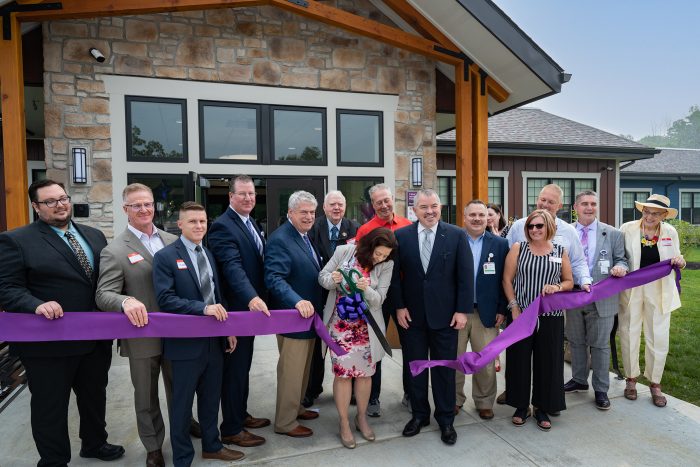Leaders at Twin Lakes and UPMC on Thursday celebrated a years-in-the-making, $16.2 million expansion at Twin Lakes that added space for 24 additional patients inside an all-new 19,300-square-foot building. RCPA Director of SUD Treatment Services, BH Division Jason Snyder was in attendance at the ribbon cutting on June 29, along with RCPA Board Chair-Elect Noreen Frederick of University of Pittsburgh Medical Center. Deborah Brodine, president of UPMC Western Psychiatric Hospital and the Behavioral Health Services Network of UPMC, is pictured in the center, holding the scissors. View the article here.
Mental Health Safety Net Services Funding: A FY 2023/24 Budget Imperative Letter
The sustained funding of community-based mental health services, such as community residential programs, family-based support, outpatient care, and crisis intervention, are critical to the wellbeing of our constituents and our communities. Funding levels for county mental health services have direct impacts on whether these important community and family supports will be available. Yet for too many years, state funding for mental health services has lagged far behind its needs. Counties find themselves advocating for the prevention of funds being cut instead of achieving the increases that are needed to catch up from years of underfunding.
This week’s letter, sent on behalf of the Coalition for the Mental Health Safety Net, stands as an open call to the PA General Assembly and stakeholders. For Pennsylvanians with a mental illness, the impact of the county funding shortfalls is already evident. The effects include: shortages of key mental health professionals; chronic underpayment of mental health providers; reductions/closures in mental health residential programs and supportive services, including employment and psychiatric rehabilitation services; uneven crisis response services; outpatient program closures; and the continuing criminalization of mental illness. Across the Commonwealth, there is no consistent level of mental health services available, and access to critical services largely depends on which county a patient lives in.
The Coalition is open to all new partners who wish to join our mission of advocacy for this 2023/24 initiative, as the time to act and engage with your representative is now. The Coalition will also be developing an advocacy toolkit for members to come together to sustain the safety net and serve those who need it most. The reality is that the demand for service far outweighs capacity and rate structures to serve this population.
If you have additional questions or would like to join the Mental Health Safety Net Coalition, please contact RCPA Policy Director Jim Sharp.
Discover RCPA Membership Benefits on July 25
Join RCPA for a Membership Benefits webinar on Tuesday, July 25, 2023, at 9:00 am to orient yourself with all that RCPA membership includes. This will certainly be important for new and potential members but will also be of value to current members, as there may be unrecognized benefits associated with our membership.
Register here to attend this webinar. Items we will review include the following and much more:
- Virtually meet the dedicated RCPA Policy Staff and RCPA lobbyists;
- Discuss the 2023 Legislative and Administrative priorities;
- Highlight RCPA division committee and subcommittee meetings as well as what they offer;
- View the RCPA member-only website;
- Review exclusive yearly education and networking events; and
- Understand other National Association memberships included with RCPA membership.
Visit the RCPA member benefits page or contact Tieanna Lloyd for more information.
We look forward to your participation in this webinar.
Senate Confirms Dr. Latika Davis-Jones As DDAP Secretary
The Pennsylvania Senate has confirmed Dr. Latika Davis-Jones as Secretary of the Department of Drug and Alcohol Programs (DDAP). As secretary, Davis-Jones leads the Commonwealth’s efforts to reduce substance use disorder (SUD) and problem gambling disorder, with a large focus on expanding access to and increasing the quality of SUD treatment.
Before serving in the Shapiro administration, Secretary Davis-Jones was Senior Director of Behavioral Health at Highmark Wholecare, a Medicaid managed care organization in Pittsburgh. Prior to that, she served as Allegheny County’s Single County Authority Administrator.
Read DDAP’s official press release.
OMHSAS/ODP Statewide Positive Approaches and Practices Meeting July 13
RCPA Continues BH/PH Webinar Series With “Navigating Change” on July 24
DDAP Issues Licensing Alert on Calculating Counselor Ratios for Nonhospital Residential SUD Treatment
Kinsey 988 Suicide and Crisis Lifeline Bill Passes House
Reminder to Register Today for the RCPA All Member Webinar on June 21
DHS Licensing Administration Updates Certificate of Compliance Process for Providers

The DHS Licensing Administration wishes to provide important information about procedural updates related to the issuance of renewal Certificates of Compliance. In August 2022, the renewal process was updated to require the Civil Rights Compliance Attestation (HS2125) be submitted together with the renewal application to Licensing Administration. Feedback with this procedure change has been favorable.
In reviewing their procedure for issuing the renewal Certificates of Compliance, the Licensing Administration has found that a significant number of providers request changes to their licenses after a renewal has been issued but before the current license expired. This adds an increase in processing time, as the administration then must revise the unexpired license and reissue the renewed license. As a result, it slows down the process to issue the other renewals in queue. Therefore, the procedure has changed. The renewal Certificates of Compliance will not be issued until the current Certificate of Compliance is within 30 days of expiration. This procedural change will better facilitate the timely and accurate issuance of renewal Certificates of Compliance.
Below are a few reminders:
- The Bureau of Equal Opportunity no longer issues an approval letter after submission of the Civil Rights Compliance (CRC) Attestation (HS2125). The renewed Certificate of Compliance verifies that the CRC Attestation (HS2125) was accepted/approved.
- The Civil Rights Compliance Attestation (HS2125) can be found here.
- Licensing Administration frequently uses email for communication, including emailing of the Certificate of Compliance. Therefore, Licensing Administration must be notified of email changes. The renewal application should also include current email addresses.
- When contacting Licensing Administration, please include the following in the subject line of the email: REASON – AGENCY/FACILITY NAME – LICENSE/CERTIFICATE NUMBER. The reason can be RENEWAL, QUESTION, REQUEST, REVISION, etc.
- The contact information for each Program Office served by Licensing Administration is as follows:
-
- Office of Children, Youth and Families (OCYF): Email | 717-787-9763
- Office of Mental Health & Substance Abuse Services (OMHSAS): Email | 717-703-0006
- Office of Long-Term Living (OLTL/BHSL) – Personal Care Homes & Assisted Living Residences: Email | 717-705-0382
- Office of Developmental Programs (ODP): Email | 717-787-6958
- Licensing Administration Director: Email | 717-705-6954
















